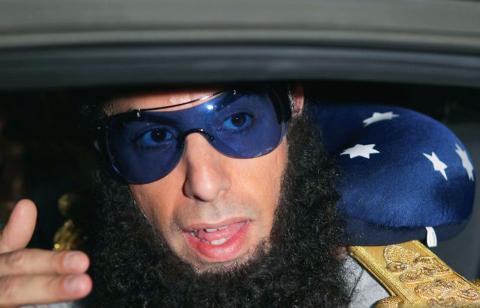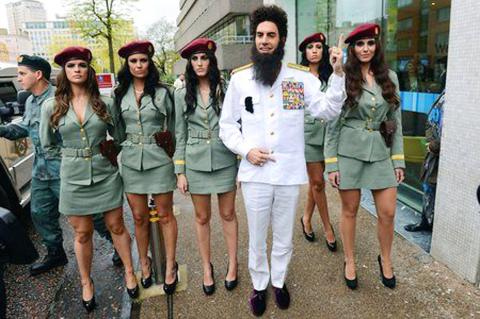As you may already know — since most of the prerelease publicity has been done in character — Sacha Baron Cohen’s latest comic avatar is Admiral General Aladeen, despot of Wadiya, a fictitious North African country, and the subject of The Dictator. Aladeen, whose desert nation is a gilded monument to his own vanity, is a (perhaps only slightly) exaggerated cartoon of strongmen like Moammar Gadhafi and Saddam Hussein, but with certain identifying features strategically blurred.
“I am not an Arab,” he says at one point, and The Dictator, directed by Larry Charles, carefully avoids references to Islam. Is this precaution enough to prevent the movie from giving offense? Probably not. But it may be enough to turn the tables on anyone who decides to take offense, which is really the point.
There is nothing especially outrageous here. The movie’s blend of self-aware insult humor, self-indulgent grossness, celebrity cameos and strenuous whimsy represents a fairly standard recipe for sketch-comedy-derived feature films. Baron Cohen, a nimble performer, long of face and limb, is like a cross between a camel and a chameleon. He seems capable of an almost infinite range of voices and appearances, all of them outlandish, and all of them at least potentially funny.

Photo Courtesy of UIP
That potential is mostly squandered in The Dictator, which gestures halfheartedly toward topicality and, with equal lack of conviction, toward pure, anarchic silliness. Aladeen, having alarmed the world with his human-rights abuses and his nuclear ambitions, is summoned to New York to address the United Nations.
There, thanks to the scheming of his Uncle Tamir (Ben Kingsley) and the ministrations of a US agent (an uncredited John C. Reilly), he finds himself replaced by a moronic double (also Baron Cohen) and forced to wander the streets like an ordinary nobody. He meets a wide-eyed activist named Zoey (Anna Faris), who gives him a job at her food co-op, and finds a sidekick (Jason Mantzoukas), who used to be one of Wadiya’s top scientists.
All of which would be fine if the jokes were better. There are a few good ones, but many more that feel half-baked and rehashed. There is, for example, a long scene in a restaurant frequented by Wadiyan refugees in which Aladeen, hoping not to be recognized, invents a series of false names for himself.

Photo Courtesy of UIP
Each name is a crazy mispronunciation of a sign in the restaurant — “Ladies’ Wash Room,” and the like — and every time he comes up with a new one, the camera pans over to the sign, just to make sure we understand what’s going on. And in case we’re slow on the uptake, the waiter (Fred Armisen) keeps insisting, “That’s a made-up name.” The joke is repeated at least four times.
Either this is the kind of meta-gag that tries to milk a laugh out of its own failure, or it represents a profound lack of confidence in both the material and the audience. Either way: So what?
Occasional attempts at post-Sept. 11 political satire fall just as flat, and supplying Aladeen with a love interest forces Baron Cohen to try sincerity, something for which he has no particular aptitude. Since women in his comic universe exist to be made fun of, rather than to be funny, Faris’ talents are pretty much wasted. Zoey is the target of Aladeen’s abuse, and also of the film’s scattershot misogyny, which is, like the dictator himself, conveniently disguised. When Aladeen calls her a “lesbian Hobbit” or recoils at the sight of her unshaved armpits, we’re really laughing at what a jerk he is. Aren’t we? Sure we are.

Photo Courtesy of UIP
Unlike his precursors Bruno, Borat and Ali G, Admiral General Aladeen is not meant to fool anyone into thinking that he is real, so viewers are denied the full measure of smugness that is Baron Cohen’s special gift to bestow. In the earlier projects (Da Ali G Show and the movies Borat and Bruno), viewers were invited to chuckle at the appalling idiocy of Baron Cohen’s characters and also at the stupidity of the suckers who took his buffoonery at face value.
When Borat, the cretin of Kazakhstan, carried a bag of his own feces to the table at a genteel dinner party, the joke lay both in the outrageousness of his behavior and, somehow, in the dismayed — yet still curiously polite — reaction of his US hosts. We could laugh at his grossness, secure in the knowledge that we weren’t really xenophobic because we were also sneering at the fools falling for the trick. Dumb hicks. Dumb foreigners. Thank goodness we’re not bigots like them!
As repellent as this logic may be in retrospect, it at least provided a queasy jolt of excitement. Something – sensitivity, good taste, the nonaggression pact between comedians and the public – was being put at risk. And there was, beyond the nervy displays of satirical hostility, a dimension of goofy absurdism that sometimes (more in Borat than in Bruno) approached the level of sublimity. Very little of that happens here, and the main insult of The Dictator is how lazy it is.

While Americans face the upcoming second Donald Trump presidency with bright optimism/existential dread in Taiwan there are also varying opinions on what the impact will be here. Regardless of what one thinks of Trump personally and his first administration, US-Taiwan relations blossomed. Relative to the previous Obama administration, arms sales rocketed from US$14 billion during Obama’s eight years to US$18 billion in four years under Trump. High-profile visits by administration officials, bipartisan Congressional delegations, more and higher-level government-to-government direct contacts were all increased under Trump, setting the stage and example for the Biden administration to follow. However, Trump administration secretary

A “meta” detective series in which a struggling Asian waiter becomes the unlikely hero of a police procedural-style criminal conspiracy, Interior Chinatown satirizes Hollywood’s stereotypical treatment of minorities — while also nodding to the progress the industry has belatedly made. The new show, out on Disney-owned Hulu next Tuesday, is based on the critically adored novel by US author Charles Yu (游朝凱), who is of Taiwanese descent. Yu’s 2020 bestseller delivered a humorous takedown of racism in US society through the adventures of Willis Wu, a Hollywood extra reduced to playing roles like “Background Oriental Male” but who dreams of one day

Gabriel Gatehouse only got back from Florida a few minutes ago. His wheeled suitcase is still in the hallway of his London home. He was out there covering the US election for Channel 4 News and has had very little sleep, he says, but you’d never guess it from his twinkle-eyed sprightliness. His original plan was to try to get into Donald Trump’s election party at Mar-a-Lago, he tells me as he makes us each an espresso, but his contact told him to forget it; it was full, “and you don’t blag your way in when the guy’s survived two

Burnt-out love-seekers are shunning dating apps in their millions, but the apps are trying to woo them back with a counter offer: If you don’t want a lover, perhaps you just need a friend? The giants of the industry — Bumble and Match, which owns Tinder — have both created apps catering to friendly meetups, joining countless smaller platforms that have already entered the friend zone. Bumble For Friends launched in July last year and by the third quarter of this year had around 730,000 monthly active users, according to figures from market intelligence firm Sensor Tower. Bumble has also acquired the